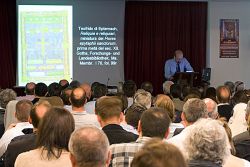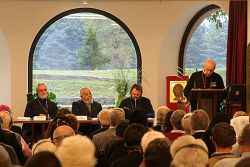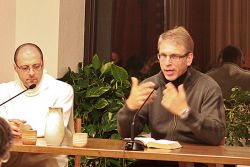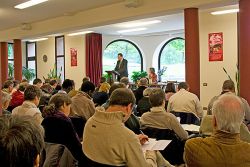Ecumenical visits and fraternal meetings
The three major occasions in the last few months on which we have been able to gratefully live the great gift of ecumenical visits and fraternal meetings were the international ecumenical conferences.
First in time, from 18 to 20 May took place the 6th Conference on the spirituality of the Reform, this year on the topic of The Lord’s Supper and the unity of the Churches, a unique occasion for a common theological reflection among the participants on the eucharist. Most of those present were students and professors of the theology departments that together with us organize these conferences: the faculties of Protestant and Catholic theology of Strasbourg, the faculty of Catholic theology of Lyons, the faculties of Protestant theology of Geneva, Lausanne, and Neuchâtel, the faculty of Waldesian theology of Rome.
 A few days later, from 31 May to 2 June, the 10th International liturgical conference was held in Bose, organized in collaboration with the National office for the Church’s cultural patrimony of the Italian Bishops’ Conference. This year the conference dealt with the subject of the liturgical adaptation of churches. The numerous participants exchanged views on the relation between liturgy and liturgical space in the light of the liturgical reform of Vatican II.
A few days later, from 31 May to 2 June, the 10th International liturgical conference was held in Bose, organized in collaboration with the National office for the Church’s cultural patrimony of the Italian Bishops’ Conference. This year the conference dealt with the subject of the liturgical adaptation of churches. The numerous participants exchanged views on the relation between liturgy and liturgical space in the light of the liturgical reform of Vatican II.
 Three months later, from 5 to 8 September, was held the 20th International ecumenical conference on Orthodox spirituality, organized in collaboration with the Orthodox Churches. We could never have expected that this occasion of fraternal ecumenical encounters would continue regularly for twenty years and that, thanks to the Lord, it might become a time and place of foretasting that unity among the Churches of Christ that, we continue to hope, will come about one day. This year’s theme was Man — custodian of creation. The participants came from numerous parts of the globe. The presence of monks and nuns was especially significant; they came from numerous Orthodox (Greece, Russia, Romania, Mount Sinai, Armenia, France, England, United States) and Catholic and Reformed monasteries (Belgium, France, Italy, Switzerland, Hungary). Present were also eleven Orthodox and six Catholic bishops. There were official delegations from the Catholic Church, from the patriarchate of Constantinople, Antioch, and Moscow, and from the Orthodox Churches of Greece, Serbia, Romania, Ukraine, Belarus, and America, of the Armenian Apostolic Church, the Church of England, as well as a representative of the Pontifical Council for the promotion of Christian unity.
Three months later, from 5 to 8 September, was held the 20th International ecumenical conference on Orthodox spirituality, organized in collaboration with the Orthodox Churches. We could never have expected that this occasion of fraternal ecumenical encounters would continue regularly for twenty years and that, thanks to the Lord, it might become a time and place of foretasting that unity among the Churches of Christ that, we continue to hope, will come about one day. This year’s theme was Man — custodian of creation. The participants came from numerous parts of the globe. The presence of monks and nuns was especially significant; they came from numerous Orthodox (Greece, Russia, Romania, Mount Sinai, Armenia, France, England, United States) and Catholic and Reformed monasteries (Belgium, France, Italy, Switzerland, Hungary). Present were also eleven Orthodox and six Catholic bishops. There were official delegations from the Catholic Church, from the patriarchate of Constantinople, Antioch, and Moscow, and from the Orthodox Churches of Greece, Serbia, Romania, Ukraine, Belarus, and America, of the Armenian Apostolic Church, the Church of England, as well as a representative of the Pontifical Council for the promotion of Christian unity.
We wish also to thank the Lord because in these last few months too he has shown us his mercy through the visits of many Italian and foreign bishops, thanks to which we have been able to revive ties of church communion: cardinal Jean-Pierre Ricard, archbishop of Bordeaux; cardinal Giuseppe Bertello, governor of the Vatican; cardinal Severino Poletto, retired bishop of Turin; archbishop Piero Marini, president of the Pontifical committee for the International eucharistic conferences; Claudio Gugerotti, apostolic nuncio in Belarus; Tommaso Valentinetti, archbishop of Pescara; Alceste Catella, bishop of Casale Monferrato and president of the episcopal commission for the liturgy of the Italian Bishops’ Conference; Giovanni Giudici, bishop of Pavia; Giulio Sanguineti, retired bishop of Brescia; Domenico Mogavero, bishop of Mazara del Vallo; Pietro Maria Fragnelli, bishop of Castellaneta; Renato Boccardo, archbishop of Spoleto-Norcia; Pier Giacomo Grampa, bishop of Lugano, together with a group of fifteen priests of his diocese, for spiritual exercises; Paolo Gillet, retired bishop of Albano; Orthodox bishops Ioannis of Pergamum, Amvrosij of Gatchina, Antonij of Boryspil’, Andrej of Remesiana, Seraphim of Germany; the retired Lutheran bishop of Linköping, Martin Lind. To all these and to the Churches entrusted to their care we assure a persevering remembrance in our prayer.
 A final moment for which we are grateful to the Lord was the visit of the Norwegian pastor Olav Fikse Tveit, secretary general of the World Council of Churches, who stayed with us for a few days of retreat. In a meeting with the community pastor Tveit spoke especially about the way the WCC tries to carry out its ecumenical vocation, a vocation that is not different from that of every Christian community: that of reciprocal acceptance, so as to be a genuine sign of unity, since it is not a mistake to have need one of another. This “reciprocal responsibility”, a theme on which pastor Tveit has reflected a great deal on the theological level and has worked greatly to see it realized, is the essential way of building unity, which “is for life, being also the way in which God creates life”. Concerning the present situation of the ecumenical movement, the secretary general told us that “today we are asked to be in solidarity with one another especially in our weaknesses… To live in solidarity, in fact, we cannot await the moment in which we will be completely in agreement among ourselves about everything… So we need signs of reciprocal acceptance just as we are.”
A final moment for which we are grateful to the Lord was the visit of the Norwegian pastor Olav Fikse Tveit, secretary general of the World Council of Churches, who stayed with us for a few days of retreat. In a meeting with the community pastor Tveit spoke especially about the way the WCC tries to carry out its ecumenical vocation, a vocation that is not different from that of every Christian community: that of reciprocal acceptance, so as to be a genuine sign of unity, since it is not a mistake to have need one of another. This “reciprocal responsibility”, a theme on which pastor Tveit has reflected a great deal on the theological level and has worked greatly to see it realized, is the essential way of building unity, which “is for life, being also the way in which God creates life”. Concerning the present situation of the ecumenical movement, the secretary general told us that “today we are asked to be in solidarity with one another especially in our weaknesses… To live in solidarity, in fact, we cannot await the moment in which we will be completely in agreement among ourselves about everything… So we need signs of reciprocal acceptance just as we are.”
